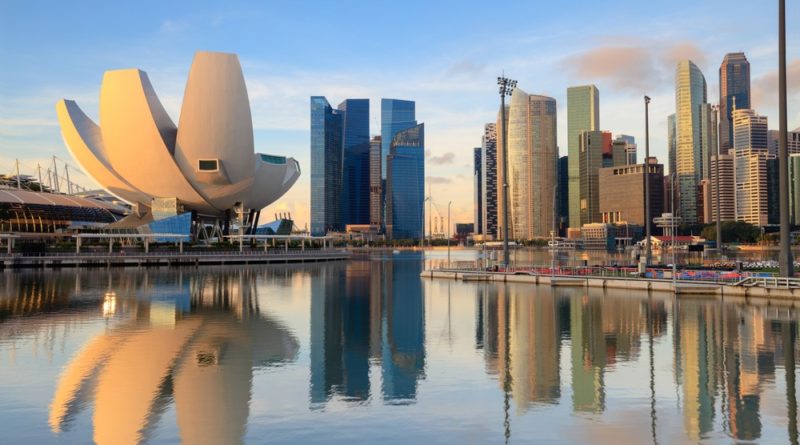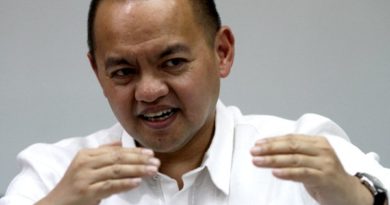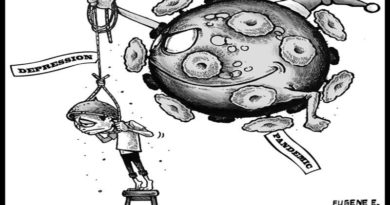LIFE+STYLE – IMMIGRATION | Mama, come home: Can the Philippines bring back its migrant workers?
Better salaries have drawn millions of Filipinos to work overseas, but critics say the growing diaspora will hurt the country in the long run.
.
.
LAGUNA – Ms Lia Quirante, 45, smiled as she saw the face of her daughter, Jehm, pop up on the laptop screen.
It was March 1, the morning after her soft-spoken 10-year-old had competed in her first school beauty pageant in Nagcarlan town, Laguna, a province 48km south-east of the capital Manila.
Ms Quirante asked if Jehm had enjoyed herself, and recalled her own younger days taking part in school beauty pageants.
Jehm finished fourth runner-up and was voted the audience favourite, but her mother was not there to see it. Ms Quirante was 1,200km away in Hong Kong, where she has worked as a domestic worker since 2018.
“I have worked here for six years now, but it never gets any easier,” Ms Quirante told The Straits Times through Zoom, as she fought back tears.
“It just hurts that I’m here taking care of someone else’s child, that I’m able to give her all my attention, all the care in the world. Yet I can’t do the same for my own daughter.”
Jehm remembered crying even as a toddler the first time she realised her mother was leaving.
“I used to ask why Mama had to leave me behind,” she said. “But as I grew older, I saw how she was using her earnings to pay for my school expenses.”
“I understood why she had to do it. She was doing it for me.”

Ms Quirante’s heartache at the separation is shared by over two million Filipinos who leave the country every year to work overseas. Some are professionals who spent years studying and mastering their fields, only to ditch their degrees for blue-collar positions overseas that pay them salaries they would never make had they stayed in the Philippines.
But now, the Philippines wants to bring this labour diaspora home.
Philippine President Ferdinand Marcos Jr has made it a cornerstone of his time in office to stem the tide of labour migration. He has promised better jobs at home on the backs of foreign investments and initiatives to ease the reintegration for returning Filipino workers.
“You gave me more than 31 million votes… In exchange, I promise to work on giving you jobs and improving the Philippines,” Mr Marcos told Filipino workers in a gathering at the National University of Singapore in September 2022.
There are over 182,000 Filipino migrant workers in the Republic.


Still, with remittances from overseas Filipino workers making up some 10 per cent of the country’s gross domestic product in the last decade, the Philippines could ill afford to lose this source of revenue.
And so, in the same breath, Mr Marcos continues to negotiate trade deals that involve Filipino labour and to tell his people that there is strong demand for their talents and skills in Europe, North America or the Middle East.
In October 2023, Mr Marcos locked in millions of dollars worth of investments from Saudi Arabian firms that could generate some 15,000 construction jobs for Filipinos back home.
He saw the investment as a reciprocal gesture for the hundreds of thousands of workers that the Philippines has been, and will continue, sending to Saudi Arabia, the top destination for Filipino labour.
The Philippines is one of the leading exporters of labour worldwide, a phenomenon that has become so entrenched in the last half-century that the government has an official term for this sector of the population: overseas Filipino workers (OFWs).
They are branded as modern-day heroes for all the sacrifices they endure that not only lead to better lives for their families, but also contribute to the Philippine economy.
Remittances by OFWs have risen steadily over the years, ballooning to 235.9 billion pesos (S$5.6 billion) in 2018, the Philippine Statistics Authority reported.
The number decreased to 134.77 billion pesos during the Covid-19 pandemic, but jumped again to 151.33 billion pesos in 2021, and 197.47 billion pesos in 2022.
According to the World Bank, the Philippines had one of the highest remittance inflows worldwide in 2021.

The labour export policy began as a stop-gap measure to prop up the ailing economy in the 1970s, during the dictatorship of Philippine president Ferdinand Marcos Sr, who died in exile in 1989.
But successive governments continued to fall back on it, aggressively promoting Filipino workers overseas while promising to improve domestic conditions to convince them to come home someday.
The current President, Mr Marcos Sr’s only son and namesake, who was elected in 2022, has also persisted with the policy.
Policymakers and migration experts acknowledge the significant economic gains, both to families and the nation, as a result of labour exportation. But critics say the resulting brain drain and the strain on family ties from prolonged separations far outweigh the benefits and are detrimental to the country in the long run.


Who are the OFWs?
The Philippine government classifies OFWs as Filipino nationals who live and work abroad, often on contracts. There were about 2.33 million OFWs as of 2023, with over 56 per cent of them females, according to the latest data from the Department of Migrant Workers (DMW).
Their numbers were at 2.16 million in 2019, but fell back down during the pandemic, when about 1.6 million workers returned to the Philippines. When pandemic restrictions were lifted, workers began going abroad again.
Most have what the DMW describes as “elementary occupations”, or jobs where they do simple and routine tasks that may require hand-held tools and considerable physical effort. These include domestic work, basic maintenance, or vehicle and machinery operation.
Nearly 70 per cent of female Filipino migrant workers work in elementary occupations, which include domestic help.
NOTE: Total figures may not tally due to rounding off
Other roles include factory workers, service and sales employees, technicians, professionals and clerical staff.
Saudi Arabia remains the top destination, with 419,776 Filipinos working there in 2023, followed by the United Arab Emirates.
Meanwhile, Singapore receives the third-largest number of Filipino workers, with 182,331.
More Filipino migrant workers are working in the Middle East and Singapore in 2023.
Poor economic conditions in the Philippines remain the main motivation for Filipinos to go abroad, said Ms Ellene Sana, executive director of the Manila-based Centre for Migrant Advocacy.
The country of 110 million people has grappled with perennial issues like poverty, high unemployment and underemployment, soaring inflation, lack of infrastructure and poor access to healthcare and other social services.
Ms Quirante was once a teacher at a school in her town, drawing a monthly salary of just 15,000 pesos. She earned another 10,000 pesos by tutoring children in the neighbourhood. At the time, it was enough to meet the family’s needs.
But Jehm was hit with a bad case of pneumonia when she was four years old. She recovered, but the hospital bills piled up. Ms Quirante took out a 180,000-peso loan that she could not pay back on her teacher’s salary.
She moved to Hong Kong to work as a domestic helper, where she earns five times what she used to as an educator.
Not only has she repaid the hospital loan, she has, with her income, built a 50 sq m house for her family, bought a motorised tricycle for her common-law husband, and is paying over 60,000 pesos a year in tuition fees and other school expenses for Jehm, her two stepchildren and a niece.
“Honestly, I don’t see myself going back to the Philippines any time soon.”


Early successes
Mr Marcos is now taking up the mantle from his predecessor, Mr Rodrigo Duterte, who set up a new government agency focused on protecting OFWs.
The DMW was created a year before Mr Duterte’s term ended in 2022, but only began operating in 2023, with a 15.8 billion-peso budget.
It streamlined the government’s different functions related to OFW protection that were previously spread out across different agencies.
It also made it easier for the Marcos government to repatriate hundreds of Filipinos who were trapped when wars broke out in Sudan and in the Gaza Strip in 2023, DMW officer-in-charge Hans Leo Cacdac told The Straits Times.
Mr Marcos’ talks in recent months with Saudi Crown Prince Mohammed bin Salman have also yielded some success. In January, some 10,000 OFWs started receiving compensation for salaries owed to them after construction firms they were working for in the Middle Eastern nation went bankrupt eight years ago.
Reacting to the results of the country’s labour force survey at end-2023, Mr Marcos posted in December that the number of unemployed Filipinos that month decreased to 1.6 million from 2.22 million recorded in the same month a year before. He said this was a clear sign that his government’s efforts to lure more investments that create jobs and improve labourers’ skills were working.
A government for migration?
Still, some advocates have raised concerns that the DMW’s existence ultimately solidified the country’s reliance on exporting Filipino workers for economic development.
But Mr Cacdac said the goal of the agency is twofold: ensure there are strong safeguards for OFWs while also implementing programmes that would convince them to return home.
“The effort to protect and help workers is a grand set-up for their successful reintegration. Because a worker who has successfully leveraged the gains of overseas experience for himself or herself is the best candidate to come home and reintegrate himself or herself back to the economy,” said Mr Cacdac.
As OFWs are highly susceptible to exploitation, maltreatment and human trafficking, it is natural for the Philippine government to create policies to protect them – from setting stringent rules for recruitment agencies to forging strong bilateral ties with countries where OFWs are present, he added.

Latest available data from the Philippine government showed that around 5,000 migrant workers experienced some form of abuse by their foreign employers in 2020. In 2023, 34-year-old domestic worker Jullebee Ranara was allegedly raped, impregnated, and then murdered by the 17-year-old son of her employer in Kuwait. Her body was dumped in the desert. Her killer has been convicted of murder.
Despite the risks, the lure of better fortunes continues to fuel the dream to go overseas to work.
Even after escaping an abusive employer while working in Hong Kong in 2023, 47-year-old domestic worker Jennie Manaloto is planning her next foray overseas.
Her employer had verbally abused her and limited how much she could eat. Fortunately, Ms Manaloto was able to cut short her two-year contract and return home.
The mother of five works odd jobs in Manila now, like selling food at roadside eateries, but plans on returning to Hong Kong as soon as possible.
“I am already thinking about going back because life is just so hard these days, especially with rising prices here,” said Ms Manaloto.

Whether it is on their own volition or they are forced to come home because of abuse, war or other calamities, returning OFWs get a one-time cash-grant of up to 50,000 pesos from the DMW, as part of the effort to give them a financial leg-up upon their return.
In certain cases, other government departments also provide grants and medical assistance to returning workers, particularly those who are rescued from abusive employers or have fled war.
State-run banks also offer special loan programmes with relaxed and flexible repayment terms. And along with other agencies, the DMW does offer business funding capital, skills training and financial literacy courses to help former migrant workers get jobs or start their own businesses.


Mr Cacdac conceded, however, that the reintegration programme is a “work in progress” for the fledgling agency.
Its success will ultimately be judged by the number of OFWs who choose to return home because they can earn salaries that match or even surpass the international pay rates that made them leave their loved ones. They would be able to spend their money within the country and pay taxes to the Philippine government, contributing to a virtuous circle of government spending on social programmes.
He said the biggest challenge faced by the DMW is in setting up career pathways for the returning OFWs – a feat that one agency alone cannot accomplish. OFWs want not just jobs, but jobs that pay well, in a country where they and their loved ones can easily access quality healthcare, education and social services.
A glimpse of hope
Still, there are success stories among the returning diaspora, like that of Mr Andrew Gutierrez, 52.

For more than two decades beginning in 1997, Mr Gutierrez kept returning to Saudi Arabia to work different office jobs, ranging from sales to administration for multinational companies.
But trouble came in June 2020, while he was employed by an electronics firm whose business was mostly with foreign military units. He said the Saudi government suspected him of being a spy, a charge he denies.
Mr Gutierrez was detained for about six months with no legal recourse. For the first 60 days, he was unable to call his wife, Jameelah, who had shortly before returned to Manila from Riyadh, where she had been a teaching assistant.
Beside herself with worry when she finally learnt of what had happened to her husband, Mrs Gutierrez sought the help of the Philippine government to help negotiate his release. Mr Gutierrez was eventually freed, but mentally traumatised by the experience.
He decided to return to the Philippines, and settled with his family in the town of Cabuyao, Laguna.
There, he applied for the government’s livelihood assistance programme for returning OFWs. The 20,000-peso grant he received after submitting his paperwork and attending an entrepreneurship course allowed him and his wife to start a halal food business.
The couple now run Kitchen Nette Cabuyao Biryani House out of the home they share with their four children, aged seven to 22.
They started by selling small tubs of chicken briyani to friends. Then they set up a Facebook page for their business, where they grew their followers to 6,400. They expanded the menu to include other South Asian food like chicken masala and Arabic dishes like shawarma and falafel, which they used to eat together during their time in Riyadh.

Mr Gutierrez said they make about 180,000 pesos in profit each month, matching what he was earning in Saudi Arabia. His family remains grateful to the Philippine government for helping them.
“The assistance in the beginning is what motivated us to work hard and succeed,” said Mrs Gutierrez.
Lofty dream for now
But they are still the exception.
Though he resigned from his company and left Saudi Arabia under duress, Mr Gutierrez was able to get severance pay amounting to hundreds of thousands of pesos from his employer.
The sum, augmented by the capital he got from the Philippine government, allowed him a viable new beginning. Many other OFWs are not as lucky, being contract workers not entitled to such benefits.
Still, they continue to be hopeful that the day will come when a good life awaits them in the Philippines. Mr Marcos, who travels frequently, often meets with OFWs during his trips and tells them that his government is laying the groundwork for their return.

“The migration phenomenon will always be there. The key thing is to work towards the goal of making that journey voluntary.”
Mr Cacdac said the government is striving to ensure protection for OFWs so they can reap the benefits of their sacrifices – because a successful OFW who is able to save enough money for their family’s needs is one likely to return home.
“If we have a developed economy with low unemployment, nobody will see migration as a matter of necessity or as a forced arrangement due to poverty,” he said.
But even the DMW acknowledges the task ahead is a difficult one.
With economic conditions still difficult, the Philippines continues to rely heavily on exporting labour. To completely eradicate the policy would be “a lofty dream”, said labour migration expert Dr Jean Franco of the University of the Philippines, as the government would have to find alternative sources of revenue to replace the hefty contribution from remittances.
“Migration will always be there, but what we hope to achieve is that those who would be going abroad are highly skilled individuals,” said Dr Franco. “And I don’t think that’s going to happen for us in the next 10 or 20 years.”
The reasons that drove thousands of Filipinos to venture out into the world in search of a better life during the time of Mr Marcos Sr – corruption, ballooning national debt, unemployment, soaring inflation and poor government services – are the same problems that his son’s government is struggling to fix today.
They are also the reasons that Ms Quirante has decided to stay put in Hong Kong for now.
Still, she looks forward to the day when she can be reunited with her daughter for good.

Like millions of other OFWs, her dream is simple.
“My only wish is for none of my children to become victims of forced migration,” said Ms Quirante. “I hope that by the time they grow older years from now, they will no longer find the need to leave the Philippines in search of a better life.”


 Memento Maxima Digital Marketing
Memento Maxima Digital Marketing






